#his rating would not make the male grandmaster level
Explore tagged Tumblr posts
Text
one thing i haven't seen many people point out in regards to the chess thing. the levels of master for chess require different ratings for men and women. the women's titles require a full 200 rating points less to reach the next level of mastery.

for casual or lower level players, say 1500 or below, this gap doesn't matter that much. for the most elite players, 200 lower rating is a massive gap. in the highest level tournaments, if someone is against a player that has a rating 200 points higher than them, they are unambiguously recognised as having a significant disadvantage. the only exception is when they are a relatively new player that has rapidly risen in the ranks, and their current rating may not be representative of their current skill level.
the current highest rated female chess player in the world is hou yifan. she actually retired recently to go to university, i believe, but no one is close to surpassing her score of 2628. incredible.
the male players with a rating of 2628 are the 130th best male players in the world.
this means that a man could not even be in the top 100 best male players in the world, meaning near zero income to be made from the sport (anything they'd make from winning regional or national championships would have to go towards paying travel and accommodation), and if he decided to transition to a woman, he would be the best in the world and make great bank, especially with the women's tournament and sponsorship initiatives, and the 'representation' he would be.
in a way, it's even more blatant that running or swimming or any of that. because you can see their ratings stay the same, but a change in pronouns can change them from a master to an international master, or even from an international master to a grandmaster.
#there's a tim chess player in the women's court#that though he is low ranked#his rating would not make the male grandmaster level#but he's made the women's grandmaster level
198 notes
·
View notes
Text
Rating Genshin character designs pt.1
I am by no means a professional character designer, hell I’m not even a professional artist (I’m self taught) but I just really wanna do this become Genshin Impact is home to some of my favourite character designs and some that I fucking hate. So let’s get into them
Jean
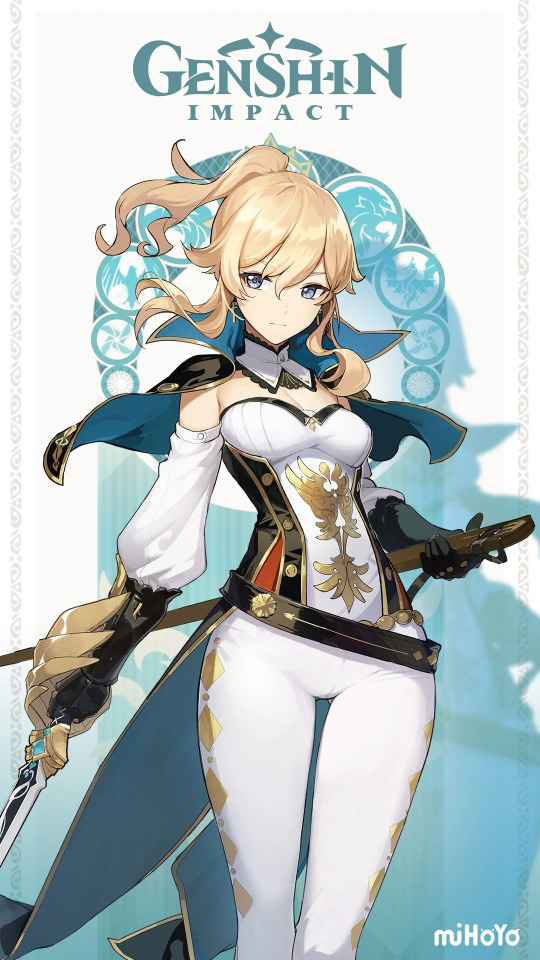
I fucking hate it
Don’t get me wrong, I love Jean, she carries my fucking team and I’ve maxed out my friendship with her. She’s a great character and has a great presence in the story, I can see why a lot of characters respect her, and I really hope to see more of her.
But what the fuck is this design???
Basic blonde bitch face, I don’t even fucking know what’s going on with her outfit. I just really really really REALLY hate her tights. I don’t know why, but I have a vendetta against tights. Maybe it’s because I grew up in BC where girls consider tights to be fashionable, but I fucking hate tights. White tights especially since more often than not they’re transparent.
I don’t know what it is, but I just don’t vibe with the colour scheme, ya feel me? There’s a rule with character design that I learned, which is have one main colour, and then have a secondary colour, and then have other colours that support those two colours. Jean is like... I can’t tell is her main colour is white or blue. The colour placement is sort of all over the place.
Jean is just basic and it just doesn’t stand out when you compare her to the other characters. I just feel like she should look better than this, she’s the acting grandmaster of the knights for crying out loud, and yet she looks like a generic background character.
She looks like Saber from the Fate series, I feel like she’s just so plain and there wasn’t really anything put into her design. Her in game model looks a bit better but it’s still kinda ‘meh.’
Like what does this outfit tell you about the character? Nothing! She doesn’t look like a powerful figure, you can’t tell she’s gentle and graceful, it doesn’t tell you that she’s a leader or tells you about how she carries herself. All her design says is “Hi I’m disposable blonde with a sword no. 235″
With all of the negatives, I do have to say that her design does a good job of directing you to look at her face. The colar and the way her hair frames her face is great but then again, her face isn’t much to look at.
Kaeya
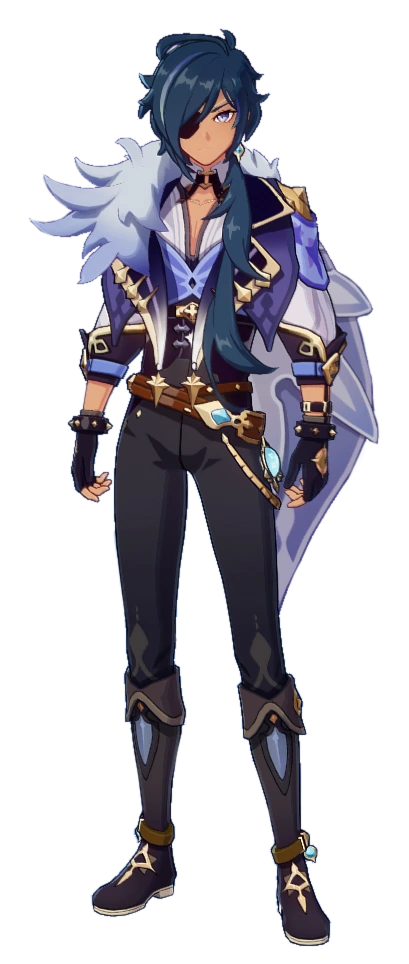
Ok, we have so much to unpack here because I LOVE Kaeya’s design
I mean look at him! Right away you can tell what he’s like! He screams shady, flirty, and eccentric!
One qualm I do have is that he looks more like a pirate than a knight, with the fur, buckles, and details, but I guess that’s fine. At least he doesn’t look basic or forgettable. And the design is a bit confusing but even then it still tells you a lot about him.
The colour placement is smart and he looks very cohesive and put together, nothing looks out of place. Kaeya’s tanned skin contrasts the cooler values perfectly and I’m honestly sad that we don’t get to see him too much.
It’s really a shame Kaeya isn’t more important and that Mihoyo doesn’t promote him the way they do the other characters (Noelle, Diluc, Zhongli, Xiangling and Fischl) He’s even overlooked by the community which is kind of sad.
Real talk though he kind of reminds me of Sinbad from Magi. Maybe not the same level of himbo energy, but the whole shady, manipulative, womanizer that pretends to be good thing is there.
But yeah, Kaeya’s design is great and I love him so much plz give him more screen time-
Albedo
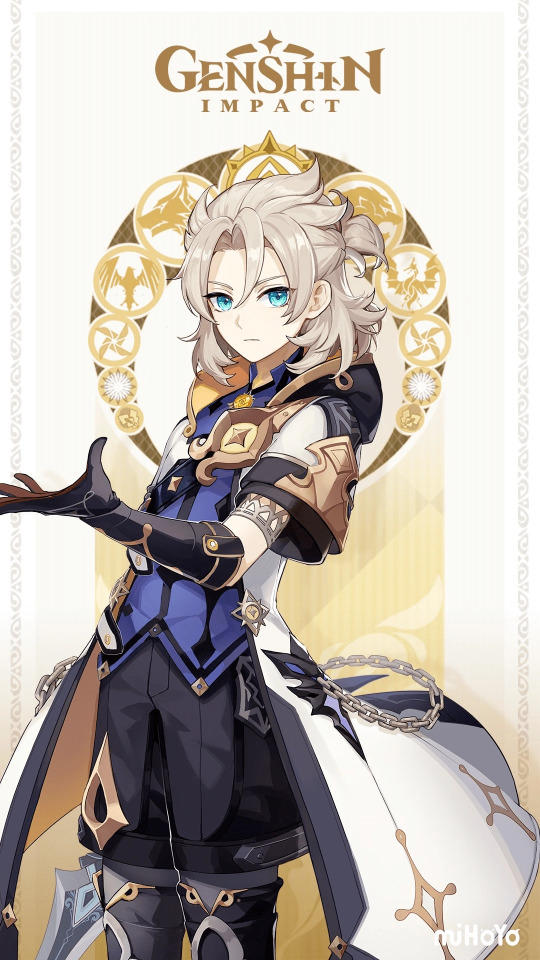
They really did my boy dirty. Seriously, he looks so fucking fine in all of his art, but then you have his in game model and he looks all greasy and weird. Someone said that Albedo with the adult male model would have worked better and honestly I agree.
But anyways! Let’s talk design!
Albedo’s colour scheme is simple but works well together, he very much looks like someone who works in a lab with his long white coat, but other than that he looks like a swordsman. It works really well for him since he is a captain in the knights of favonious as well as an alchemist.
That’s all well and good, it tells you his occupation but it doesn’t really tell you about his personality. Like if I were to show you this guy without any context, you’d assume he’s kind and gentle soul. Which is kind of true (depends on who he’s interacting with) but we know Albedo to be analytical and sort of brisk and cold. Not cruel by any means, but he’s not very nice and gentle either.
Overall very nice, I like it a lot, I really wanna have a coat like that, 7/10 solid design.
Diluc
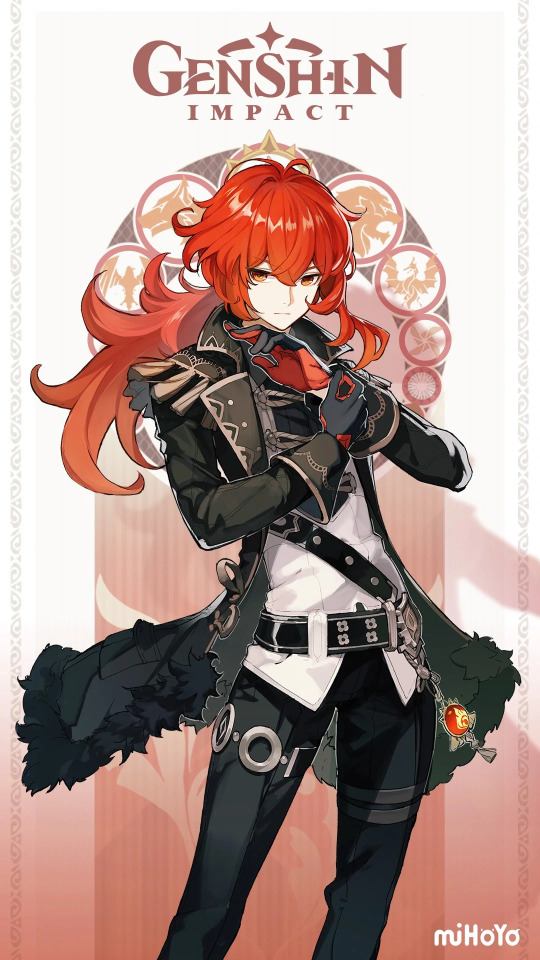
It’s... it’s kinda meh. Is he hot? Absolutely he’s smoldering, but I just... I don’t know. You can tell that he’s rich and all of that since he’s sort of wearing a suit, but that’s it. I also really hate that they didn’t give him coattails, I think coattails would have carried this rich untouchable vibe better. The weird fur is just kind of tacky.
I feel like giving his outfit more red would help him immensely, I’m not digging the white, it’s just there. For no reason. I guess it helps to break up all the black, but giving him a red vest would have easily done the same thing while staying true to him. He has red on his gloves, why not put a bit more on his body?
I guess my point is more red accents would do him good. Diluc is recognizable, but it’s mostly thanks to his hair. If I gave him a different outfit with the same colours it wouldn’t really change much. He lacks things like like Kaeya’s details or Albedo’s coat that make him really memorable. You could have a character who looks different, but I think to be truly memorable it’s gotta sell the character and suit them.
Overall, his design is sort of overrated in my opinion.
Ningguang
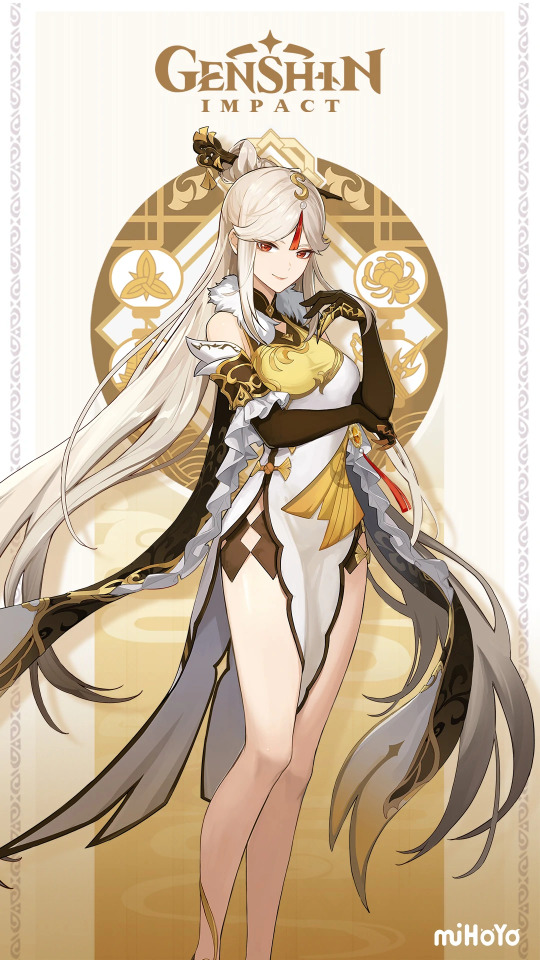
Ok ok queen alert I love her so much. Ningguang doesn’t just look hot her design sells her so well I love her.
You can tell that she’s ruch, elegant, and powerful. The white, gold and black just go so well together and the way it’s placed is just aaaaahhhhh she’s so pretty what the hell. I strive to make a character that looks this good.
I just have no idea what’s going on with her shorts. That’s like my only complaint. Just give her regular booty shorts? Like Beidou’s? You don’t need the diamonds, if you wanted them you could make it like a pattern.
But other than that she really looks like she rules a country. She’s just so pretty omg.
Design aside, Ningguang deserved to be a five star, she’s so strong like there’s a guy who’s Ningguang can so 29k per crystal with her ult. Ningguang has such a strong presence within the game compared to Kequing and Ganyu who are just sort of there. Ningguang is one of the few characters who get a 10/10 in performance, design, and character wise. I love her.
Beidou
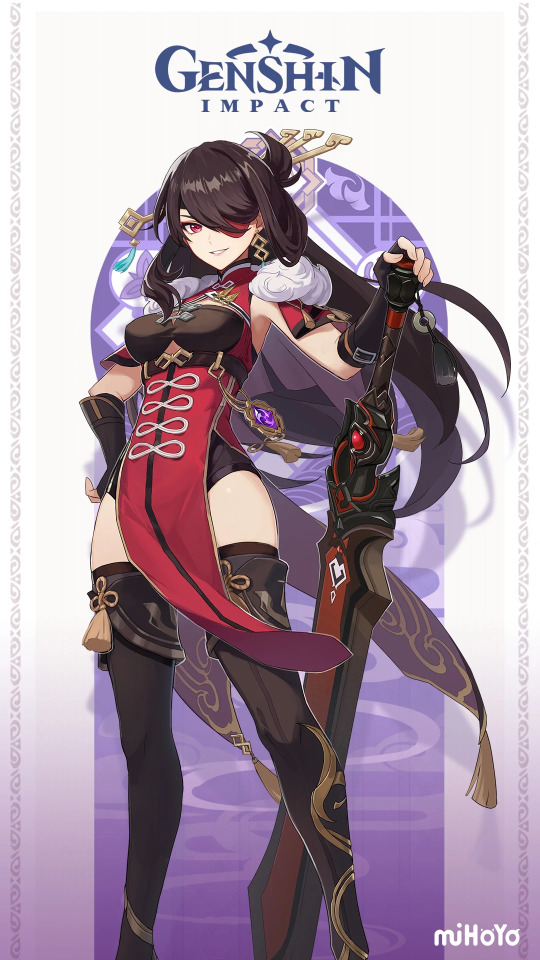
Another queen. I am so whipped for Beidou and Ningguang guys it’s not even funny-
Anyways I love Beidou so much, I love her dress her colour scheme, she’s just so cool. The black and red is consistent and well placed unlike SOME OTHER CHARACTER.
You can tell that she’s a pirate, that she’s a strong warrior and idk why but she just screams laid back lesbian aunt. Those are the vibes I get from her. I love her. You can’t tell in this image, but she has anchors on the back of her gloves and it’s a really nice touch that adds to her as a pirate.
The hairstyle, her outfit, the eye patch, Beidou is just iconic and so easy to recognize. I remember not knowing anything about Genshin impact but I saw some advertisements for it and Beidou’s design really stuck with me because I recognized her when I got her.
Another one of the few who get a 10/10 in all aspects. Love her, and I can’t wait to set sail for Inazuma with her.
#I like how for the guys I'm actually talking about their designs but with the girls I'm simping#stay in school kids#kouryuu's shit#beidou#beidou genshin impact#kaeya#kaeya genshin impact#ningguang#ningguang genshin impact#diluc#diluc genshin impact#jean#jean genshin impact#albedo#albedo genshin impact
65 notes
·
View notes
Text
Marvel Cinematic Universe: Thor: Ragnarok (2017)
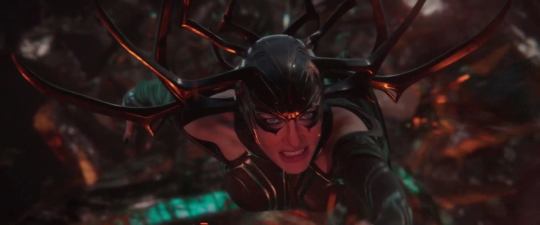
Does it pass the Bechdel Test?
No.
How many female characters (with names and lines) are there?
Four (23.52% of cast).
How many male characters (with names and lines) are there?
Thirteen.
Positive Content Rating:
Three.
General Film Quality:
Loads of fun, though tonally dissonant; works best on first viewing. Easily the superior film of the Thor franchise, though that’s not a huge achievement considering its predecessors.
MORE INFO (and potential spoilers) UNDER THE CUT:
Passing the Bechdel:
Sigh.
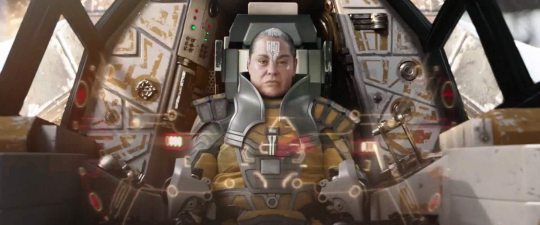
Female characters:
Hela.
Scrapper 142 (I know, she is credited as Valkyrie, but since the name is never used to address her in the film it doesn’t count by the rules of this blog; if she didn’t happen to be referred to by her scrapper number a few times, she wouldn’t count as a named character at all).
Topaz.
Natasha Romanoff.
Male characters:
Thor.
Surtur.
Skurge.
Loki.
Stephen Strange.
Odin.
Volstagg.
Hogun.
The Grandmaster.
Carlo.
Korg.
Bruce Banner.
Heimdall.
OTHER NOTES:
The use of Immigrant Song is my favourite thing about this movie, to be honest. I don’t mean that as an insult, it’s just such a good choice.
The inclusion of Doctor Strange in this film feels like a pointless misstep, a distraction at what is really a vital early point in establishing tone, especially considering this useless scene is what leads us in to...
...the literal death of Odin and introduction of Big Bad Hela, all of which should be emotional and intense and is instead flat and dissonant in the extreme. Watching this for the first time, I was very concerned that the whole film was just gonna end up gimmicky and soulless. While it does pick up, I was also not wrong about that early assessment.

Not that I was attached to Thor’s friends from the previous films, but they sure do just kill them off without fanfare, except for Sif who just doesn’t appear at all (logically, we should assume she dies off-screen, otherwise there’s no reason for her not to be up-front with Thor at the end of the movie). Fandral doesn’t even get a line in before he croaks, that’s how irrelevant these franchise-veteran characters are. Emotional engagement in plot and character is for chumps, anyway.
*whispers* Jeff Goldblum is here.
“Piss off, ghost!”
Hulk reveal is pretty solid, if you manage not to have been spoiled (a tall order, since it was in the promos).
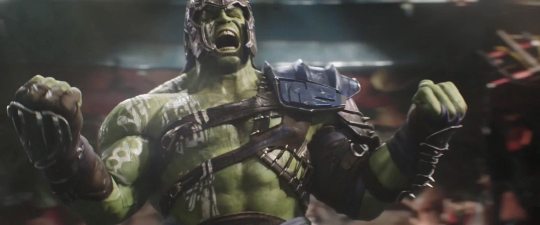
Heimdall is still the MVP of the Thor franchise.
Can’t believe it took this long for any movie to squeeze some real fun and heart out of the Hulk character. This is way better than embarrassingly forcing a love match on him.
The valkyrie-battle memory is soooo good-looking.
This movie is too recent to be using the word ‘gypsy’...
Thor’s story about Loki pretending to be a snake when they were kids is the good shit.
But, Immigrant Song is still the most inspired choice of the film. Not sorry.

So, this is one of those movies which I felt was pretty over-hyped, to be honest. It is great fun, don’t get me wrong, it’s fresh and hilarious and subversive and way the Hell better than the previous Thor films, plus it has a great cast and strong visuals and they used Immigrant Song really effectively...but the tone of the film is an absolute fucking mess, the plotting is a shambles, and there’s nowhere near as much heart and weight underpinning it all as what there should be for a movie involving the near-total destruction of an entire civilisation. The majority of the movie is handed over to a shenanigan-heavy side-plot of no consequence to the central conflict, while the central conflict - LITERAL RAGNAROK - is relegated to a handful of scenes sprinkled across the film, obliterating any chance of it seeming meaningful or even particularly serious. The strongest point of the story is the final act, once Thor and company finally get to Asgard to confront Hela, but the narrative doesn’t earn that strong finish; it just goes to show how much more engaging the rest of the film could have been if they had stayed on track.
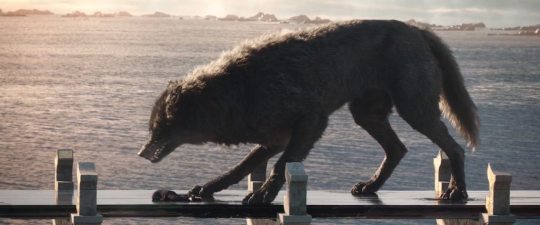
This is a big part of why this movie - while a delightful surprise on first viewing - doesn’t age particularly well on repeat; this was my fourth time through, and by the third quarter, as Sakaar draaaagged through its roster of jokes and pratfalls, my attention span was waning fast. Even if the entire garbage-planet sidebar was not distracting from what should have been a very serious main plot, I’m not sure it would remain engaging long-term, since it is rather spare and low on emotional/character investment; it’s not a pitfall of comedy that has to exist (heavily-emotional and/or dark comedies are definitely a real thing), but unfortunately, this is not a movie that is very interested in what has come before it, and it expresses that disinterest by neglecting any element of the established Thor mythology which might have brought this plot a sense of meaning. As such, rather than feeling like ‘the Thor movie that finally got it right’, it’s more like a reboot, with old characters unceremoniously ditched and any sense of purpose or import in old story threads or histories gone right alongside Asgard itself.
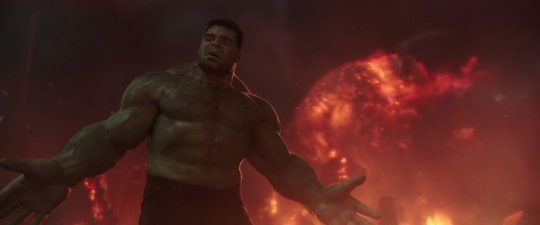
I’ve seen people praise this film for its ‘anti-Imperialism, anti-colonialism’ message, but I feel it’s a point weakly made onscreen; any depth to that argument would require a more sincere effort from the script in addressing those scant Asgard scenes, and as such, I feel that this element - though it isn’t completely wishful thinking - is much more in the eye of the beholder than it is a function of the narrative itself. The attempt to engage with any thoughtful discussion on Asgard’s legacy is a swift casualty of the film’s overall superficiality, just the same as the devastation of Asgard and the decimation of its population is blithely underplayed because, hey, Thor vs Hulk is worth way more attention than genocide, right? It’s that tonal dissonance in the two pieces of the plot which keeps me from really relaxing and enjoying the lightness, because that lightness is both excessive and out-of-place; I feel uncomfortable being asked to just shrug and go with it, I want to be emotionally involved and moved by the plight of the Asgardians, and instead I’m stuck watching Thor get a haircut and an eyeful of Hulk dick. Under almost any other circumstances, I would be all about a hard-comedy version of Thor, especially after the generic drudgery of the earlier installments in the franchise, but at the same time as Ragnarok? Not so much.
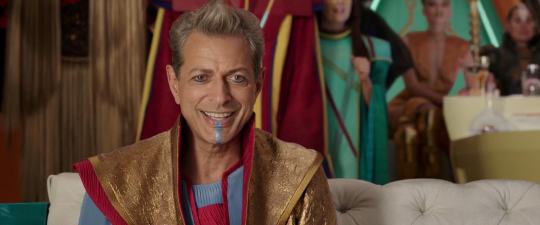
That said? This film is definitely not without quality. Comedic quality, for sure (anything with Taika Waititi’s name attached is worth a look), and there really are some great casting flourishes (though I maintain disappointment that the Asgard plot is so undersold, because it means Karl Urban and especially Cate Blanchett are under-utilised); for the interests of this blog, it’s that Scrapper 142 aka Valkyrie who forms the highlight (and she’s a worthy highlight without the context of this blog, too). Valkyrie’s drunk, angry sauntering and her snappy disregard for Thor’s righteous pontificating positions her within an archetype normally restricted to male characters only, too loose and unseemly for a female character, who might be found dislikeable and (horror of horrors) too sloppy to be sexy, whereas a man in the same archetype is funny, a ‘lovable asshole’, and the perception of his appearance is not tied up in his behaviour the same way nor is he under the same pressure to prioritise his appeal for the audience in the first place. Angry male drunkards who begrudgingly tag along with the protagonist in the end because they’re surly but not bad, those are a dime a dozen, but a woman in the same position? A rare gem indeed. And Valkyrie is more than just a fresh twist on an old cliche; her personality is grounded, it has a relatable simplicity (disillusionment with a side-order of survivor’s guilt), and there’s a confidence about the way she and the unspoken parts of her life are presented, without need to force a connection with Thor and his personal plight in order to justify Valkyrie’s actions or relevance to the plot. She’s an entirely self-contained character who could just as easily have the story to herself with no further mention of Thor et al., and that’s the hallmark of any well-constructed character: the ability to stand alone.
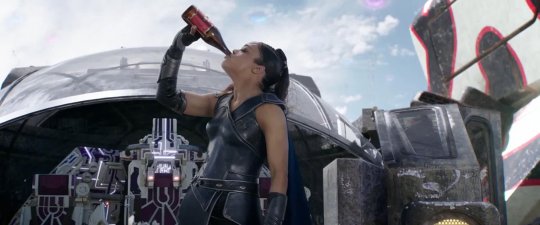
As a whole, this movie is far from bad - when I call it overrated, I am very much talking about the fact that it’s mostly a string of shenanigans with minimal narrative underpinning, and while that’s not a terrible thing in itself, I do think the hype around this movie implied that it had something more to offer than just laughs and a retro look. For me personally, the lack of emotional engagement and character stakes is close to a fatal flaw, and so while I enjoy this movie on a superficial level, it gives me nothing I need in order to really dig it (for others, obviously, this is not a problem). It always rubs me the wrong way to see something completely disavow previous chapters in the same story - there’s a big difference between developing an idea in a new direction, and simply ditching whatever you didn’t like about what came before - and I would have preferred to see this film make its changes with at least a modicum of respect for the foundations it is building upon (basic as the previous Thor films were, they weren’t catastrophic embarrassments). And yes, ultimately, the burying of the Ragnarok plot under a pile of Planet Garbage (feat. Jeff Goldblum) is just a little unforgivable in my mind, and it’s the first thing I think of whenever this film pops up; I really, really wish that Ragnarok were not part of this plot at all, that the Sakaar part of the story (i.e. the part that The Powers That Be were actually invested in, clearly) formed the bulk of the second film in the Thor franchise instead, since that movie basically sucked and took itself too seriously, and then the Thor film which took itself seriously could have been actually about Ragnarok. Basically, I wish that Marvel had gotten their shit together sooner rather than later with this part of the franchise, because while this worked out fine for them monetarily, narratively it’s just not a step I can get behind.
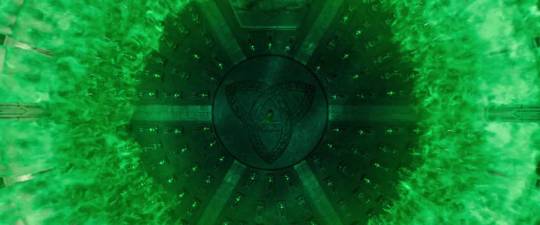
2 notes
·
View notes
Photo

Name: Thor Odinson Power Level: Street level (Singlehandedly took down a squad of SHIELD agents) | City level (Destroyed Sokovia, which was around that size) | Island level (Covered Asgard in a storm. Battled Hela and managed to harm her) Gender: Male Age: 1,053 Classification: Asgardian
Personality: Originally, he was very arrogant and full of himself, and sought battle to prove his strength and heroism. He was also very short-sighted, acting on impulse or however he felt justified. He believed that he was entitled to the Asgard throne, and eagerly awaited his coronation.
For his inexcusable actions and behavior, his father Odin stripped him of his powers, titles and rights, banishing him to Midgard until he proved himself worthy of his power. The plan worked and he returned humbled and much wiser, and even thanked his father for the lessons he learned.
After his exile and subsequent return, Thor has become a noble warrior and a man of honor. He now thinks through his actions, and often reflects on his past behavior. He has dislike of mortal technology and science for creating supervillains and admires heroes with courage, honor, compassion, and the gift of battle. He was very wise about mortal tales and criticizing villains about their abilities they boasted. He has occasional difficulty with human and Earth culture, but appears to have become more accustomed to it while working with the Avengers.
He has a large amount of respect for family, who have defined his personality -- his father Odin and his mother Frigga, who he loves very much. Had it not been for his wise father, he would still be full of arrogance and irresponsibility, a fact that he is well aware of. His mother's similarly wise but gentle touch taught him to fight for good. He initially has a complicated relationship with his troublemaking brother Loki, upset with him for the trouble he has caused on Earth and Asgard. However, he does care for his brother, and wishes for him to stop his dangerously mischievous ways. However, he is not above fighting his brother if it means protecting others. However after Loki redeemed and becomes good Loki and Thor's relationship is affectuos and sweet.
Powers & Abilities: He possess a number of superhuman attributes common among the Asgardians but however, as the son of Odin, some are considerably more developed than those of the vast majority of his race. He is the second most powerful Asgardian, with only his father being more powerful than him and is one of the two strongest Avengers alongside the Hulk. Thor also has extensive combat prowess learned through centuries of training and battlefield experience. Asgardian Physiology: As an Asgardian, Thor has several superhuman abilities. Superhuman Strength: Thor has extraordinary strength, easily surpassing most other Asgardians. Typically in battle he will send opponents flying with a single blow, and has proven capable of outperforming a number of much larger opponents in tests of strength. With his bare hands he showed himself able to stagger the Hulk, and has overthrown a Leviathan with a single hammer blow. As the first born son of Odin, Thor is physically the strongest Asgardian alive. Superhuman Stamina: Thor's advanced musculature is considerably more efficient than the musculature of a human, and his fitness is also greater than most other Asgardians. His muscles produce minimal fatigue toxins during physical activity, enabling him to exert himself at peak capacity for extended periods without tiring. Invulnerability: Thor's skin, muscle, and bone are extremely dense and durable compared to that of humans, contributing to a proportionately greater mass and extreme physical durability. Thor can withstand impact trauma up to blows from the Hulk with little more than a bloodied nose. Thor was hit by a direct lightning strike from Gungnir, showing no injury. He was struck several times by Algrim, with only a few cuts to his face. He has also fallen from great heights without sustaining lasting damage. Superhuman Speed: Thor as a Asgardian can move faster than even the finest human athlete regardless of his great size, building and body density. He displayed this power while fighting Hulk in the Helicarrier as he tackled the Hulk through the wall of Helicarrier in a matter of second appearing as a blur. Superhuman Agility: Thor's agility, balance, and bodily coordination make him a great warrior in battle. He moves with incredible grace and speed despite his size and body density. He was able to dodge the wing of a jet fighter thrown at him by the Hulk while they battled in the hangar bay. Regenerative Healing Factor: Thor's injuries heal at a staggering rate. He has recovered from moderate penetration wounds to the abdomen in a matter of minutes, and has been able to stand recover quickly from heavy impact trauma, including blows from the Hulk and a high impact fall. With Mjolnir in hand his recovery has extended to complete bodily restoration after suffering mortal injuries in a non-powered state. Superhuman Longevity: Thor has a lifespan far longer than that of a human being. While not truly immortal, he is known to be over one-thousand years of age. Atmokinesis: Though Thor's relying on Mjölnir has caused a lack of practise Thor is able to control weather without relying on Mjölnir. So far he has been seen only creating rain and electricity without relying Mjölnir. Electrokinesis: Thor is able to generate electricity from his body without relying on Mjölnir.
~~Allies/Friends~~ Tony Stark/Iron Man, Hawkeye, Steve Rogers/Captain America, Nick Fury, Bruce Banner/The Hulk, Black Widow, Black Panther, Loki, Scarlet Witch, Valkirie
~~Enemies~~ Loki Laufeyson (formerly), the Frost Giants, Malekith the Accursed, Kurse, Dark Elves, Ultron, Chitauri, Enchantress, Hela, Skurge (formerly), Surtur, Grandmaster
2 notes
·
View notes
Photo

Universal Basic Income as replacement for the welfare state. "Every American age 21+ would get a $13k annual grant. The UBI is to be financed by getting rid of Social Security, Medicare, Medicaid, etc. By 2020, a UBI will be nearly a trillion dollars cheaper than the current system."
A guaranteed income for every American
Replacing the welfare state with an annual grant is the best way to cope with a radically changing U.S. jobs market—and to revitalize America’s civic culture
Charles Murray | June 3, 2016 11:59 am | The Wall Street Journal
When people learn that I want to replace the welfare state with a universal basic income, or UBI, the response I almost always get goes something like this: “But people will just use it to live off the rest of us!” “People will waste their lives!” Or, as they would have put it in a bygone age, a guaranteed income will foster idleness and vice. I see it differently. I think that a UBI is our only hope to deal with a coming labor market unlike any in human history and that it represents our best hope to revitalize American civil society.
A UBI would present the most disadvantaged among us with an open road to the middle class if they put their minds to it.
The great free-market economist Milton Friedman originated the idea of a guaranteed income just after World War II. An experiment using a bastardized version of his “negative income tax” was tried in the 1970s, with disappointing results. But as transfer payments continued to soar while the poverty rate remained stuck at more than 10% of the population, the appeal of a guaranteed income persisted: If you want to end poverty, just give people money. As of 2016, the UBI has become a live policy option. Finland is planning a pilot project for a UBI next year, and Switzerland is voting this weekend on a referendum to install a UBI.
The UBI has brought together odd bedfellows. Its advocates on the left see it as a move toward social justice; its libertarian supporters (like Friedman) see it as the least damaging way for the government to transfer wealth from some citizens to others. Either way, the UBI is an idea whose time has finally come, but it has to be done right.
First, my big caveat: A UBI will do the good things I claim only if it replaces all other transfer payments and the bureaucracies that oversee them. If the guaranteed income is an add-on to the existing system, it will be as destructive as its critics fear.
Second, the system has to be designed with certain key features. In my version, every American citizen age 21 and older would get a $13,000 annual grant deposited electronically into a bank account in monthly installments. Three thousand dollars must be used for health insurance (a complicated provision I won’t try to explain here), leaving every adult with $10,000 in disposable annual income for the rest of their lives.
People can make up to $30,000 in earned income without losing a penny of the grant. After $30,000, a graduated surtax reimburses part of the grant, which would drop to $6,500 (but no lower) when an individual reaches $60,000 of earned income. Why should people making good incomes retain any part of the UBI? Because they will be losing Social Security and Medicare, and they need to be compensated.
The UBI is to be financed by getting rid of Social Security, Medicare, Medicaid, food stamps, Supplemental Security Income, housing subsidies, welfare for single women and every other kind of welfare and social-services program, as well as agricultural subsidies and corporate welfare. As of 2014, the annual cost of a UBI would have been about $200 billion cheaper than the current system. By 2020, it would be nearly a trillion dollars cheaper.
Finally, an acknowledgment: Yes, some people will idle away their lives under my UBI plan. But that is already a problem. As of 2015, the Current Population Survey tells us that 18% of unmarried males and 23% of unmarried women ages 25 through 54—people of prime working age—weren’t even in the labor force. Just about all of them were already living off other people’s money. The question isn’t whether a UBI will discourage work, but whether it will make the existing problem significantly worse.
I don’t think it would. Under the current system, taking a job makes you ineligible for many welfare benefits or makes them subject to extremely high marginal tax rates. Under my version of the UBI, taking a job is pure profit with no downside until you reach $30,000—at which point you’re bringing home way too much ($40,000 net) to be deterred from work by the imposition of a surtax.
Some people who would otherwise work will surely drop out of the labor force under the UBI, but others who are now on welfare or disability will enter the labor force. It is prudent to assume that net voluntary dropout from the labor force will increase, but there is no reason to think that it will be large enough to make the UBI unworkable.
Involuntary dropout from the labor force is another matter, which brings me to a key point: We are approaching a labor market in which entire trades and professions will be mere shadows of what they once were. I’m familiar with the retort: People have been worried about technology destroying jobs since the Luddites, and they have always been wrong. But the case for “this time is different” has a lot going for it.
When cars and trucks started to displace horse-drawn vehicles, it didn’t take much imagination to see that jobs for drivers would replace jobs lost for teamsters, and that car mechanics would be in demand even as jobs for stable boys vanished. It takes a better imagination than mine to come up with new blue-collar occupations that will replace more than a fraction of the jobs (now numbering 4 million) that taxi drivers and truck drivers will lose when driverless vehicles take over. Advances in 3-D printing and “contour craft” technology will put at risk the jobs of many of the 14 million people now employed in production and construction.
The list goes on, and it also includes millions of white-collar jobs formerly thought to be safe. For decades, progress in artificial intelligence lagged behind the hype. In the past few years, AI has come of age. Last spring, for example, a computer program defeated a grandmaster in the classic Asian board game of Go a decade sooner than had been expected. It wasn’t done by software written to play Go but by software that taught itself to play—a landmark advance. Future generations of college graduates should take note.
https://youtu.be/TnUYcTuZJpM?t=1m28s
Exactly how bad is the job situation going to be? An Organization for Economic Cooperation and Development study concluded that 9% of American jobs are at risk. Two Oxford scholars estimate that as many as 47% of American jobs are at risk. Even the optimistic scenario portends a serious problem. Whatever the case, it will need to be possible, within a few decades, for a life well lived in the U.S. not to involve a job as traditionally defined. A UBI will be an essential part of the transition to that unprecedented world.
The good news is that a well-designed UBI can do much more than help us to cope with disaster. It also could provide an invaluable benefit: injecting new resources and new energy into an American civic culture that has historically been one of our greatest assets but that has deteriorated alarmingly in recent decades.
A key feature of American exceptionalism has been the propensity of Americans to create voluntary organizations for dealing with local problems. Tocqueville was just one of the early European observers who marveled at this phenomenon in the 19th and early 20th centuries. By the time the New Deal began, American associations for providing mutual assistance and aiding the poor involved broad networks, engaging people from the top to the bottom of society, spontaneously formed by ordinary citizens.
These groups provided sophisticated and effective social services and social insurance of every sort, not just in rural towns or small cities but also in the largest and most impersonal of megalopolises. To get a sense of how extensive these networks were, consider this: When one small Midwestern state, Iowa, mounted a food-conservation program during World War I, it engaged the participation of 2,873 church congregations and 9,630 chapters of 31 different secular fraternal associations.
Did these networks successfully deal with all the human needs of their day? No. But that isn’t the right question. In that era, the U.S. had just a fraction of today’s national wealth. The correct question is: What if the same level of activity went into civil society’s efforts to deal with today’s needs—and financed with today’s wealth?
The advent of the New Deal and then of President Lyndon Johnson’s Great Society displaced many of the most ambitious voluntary efforts to deal with the needs of the poor. It was a predictable response. Why continue to contribute to a private program to feed the hungry when the government is spending billions of dollars on food stamps and nutrition programs? Why continue the mutual insurance program of your fraternal organization once Social Security is installed? Voluntary organizations continued to thrive, but most of them turned to needs less subject to crowding out by the federal government.
This was a bad trade, in my view. Government agencies are the worst of all mechanisms for dealing with human needs. They are necessarily bound by rules applied uniformly to people who have the same problems on paper but who will respond differently to different forms of help. Whether religious or secular, nongovernmental organization are inherently better able to tailor their services to local conditions and individual cases.
Under my UBI plan, the entire bureaucratic apparatus of government social workers would disappear, but Americans would still possess their historic sympathy and social concern. And the wealth in private hands would be greater than ever before. It is no pipe dream to imagine the restoration, on an unprecedented scale, of a great American tradition of voluntary efforts to meet human needs. It is how Americans, left to themselves, have always responded. Figuratively, and perhaps literally, it is in our DNA.
Regardless of what voluntary agencies do (or fail to do), nobody will starve in the streets. Everybody will know that, even if they can’t find any job at all, they can live a decent existence if they are cooperative enough to pool their grants with one or two other people. The social isolates who don’t cooperate will also be getting their own monthly deposit of $833.
Some people will still behave irresponsibly and be in need before that deposit arrives, but the UBI will radically change the social framework within which they seek help: Everybody will know that everybody else has an income stream. It will be possible to say to the irresponsible what can’t be said now: “We won’t let you starve before you get your next deposit, but it’s time for you to get your act together. Don’t try to tell us you’re helpless, because we know you aren’t.”
The known presence of an income stream would transform a wide range of social and personal interactions. The unemployed guy living with his girlfriend will be told that he has to start paying part of the rent or move out, changing the dynamics of their relationship for the better. The guy who does have a low-income job can think about marriage differently if his new family’s income will be at least $35,000 a year instead of just his own earned $15,000.
Or consider the unemployed young man who fathers a child. Today, society is unable to make him shoulder responsibility. Under a UBI, a judge could order part of his monthly grant to be extracted for child support before he ever sees it. The lesson wouldn’t be lost on his male friends.
Or consider teenage girls from poor neighborhoods who have friends turning 21. They watch—and learn—as some of their older friends use their new monthly income to rent their own apartments, buy nice clothes or pay for tuition, while others have to use the money to pay for diapers and baby food, still living with their mothers because they need help with day care.
“A powerful critique of the current system is that the most disadvantaged people in America have no reason to think that they can be anything else. They are poorly educated, without job skills, and live in neighborhoods where prospects are bleak. “– Charles Murray
These are just a few possible scenarios, but multiply the effects of such interactions by the millions of times they would occur throughout the nation every day. The availability of a guaranteed income wouldn’t relieve individuals of responsibility for the consequences of their actions. It would instead, paradoxically, impose responsibilities that didn’t exist before, which would be a good thing.
Emphasizing the ways in which a UBI would encourage people to make better life choices still doesn’t do justice to its wider likely benefits. A powerful critique of the current system is that the most disadvantaged people in America have no reason to think that they can be anything else. They are poorly educated, without job skills, and live in neighborhoods where prospects are bleak. Their quest for dignity and self-respect often takes the form of trying to beat the system.
The more fortunate members of society may see such people as obstinately refusing to take advantage of the opportunities that exist. But when seen from the perspective of the man who has never held a job or the woman who wants a stable family life, those opportunities look fraudulent.
My version of a UBI would do nothing to stage-manage their lives. In place of little bundles of benefits to be used as a bureaucracy specifies, they would get $10,000 a year to use as they wish. It wouldn’t be charity—every citizen who has turned 21 gets the same thing, deposited monthly into that most respectable of possessions, a bank account.
A UBI would present the most disadvantaged among us with an open road to the middle class if they put their minds to it. It would say to people who have never had reason to believe it before: “Your future is in your hands.” And that would be the truth.
Mr. Murray is the W.H. Brady Scholar at the American Enterprise Institute. His book advocating a universal basic income, “In Our Hands: A Plan to Replace the Welfare State,” was first published by AEI in 2006. A revised edition will be out later this month.
This article was found online at: http://ift.tt/1U9bn5O
1 note
·
View note
Text
From Whence He Sprang - 04
Title: Culmination
Part: 04 of 18
Rated: T for suggestive themes
The Labyrinth
Location Unknown
Time Unknown
He had meat. That was all that mattered.
He tore into it with wild abandon, tearing it apart with his teeth and bare hands, swallowing bloody mouthfuls of it as quickly as he could in order to satiate the hunger he felt gnawing inside of him. It had been days since he’d last eaten, and he didn’t know when he’d be able to get more meat.
There had been a time, what seemed like eons ago, where he’d been above all of this. Once, he’d been Edmond Saracin, proud scion of a banking family in Brazil that had been members of the Court of Owls since its inception hundreds of years ago. He himself had risen to become a member of Parliament, the Court’s ruling body that was answerable only to the Grandmaster himself. Wealth. Power. Status. He’d had it all.
And yet, he wanted more.
He’d tried to siphon off funds from the Court’s projects and direct them towards his own ends. He’d thought his status as a member of Parliament would protect him. He’d been wrong. He’d been caught within months and taken into custody by the Talonmaster himself.
With the Grandmaster presiding over the trial, his sentencing had been quick, the verdict clear from the start. Execution. But not a quick, clean death. No, that would have been too merciful. The Court was many things, but merciful? Never. His death was to be slow, drawn out, a warning to any member of the Court who thought to use its resources towards their own selfish ends. They’d thrown him into the Labyrinth as soon as the Grandmaster had finished reading the sentence.
Those first weeks had been tough, at first. Water was relatively plentiful, with several channels and pools fed by an artificial stream the Court had built into the Labyrinth, but food was scarce. The only thing that had kept him alive was the fact that he’d sometimes manage to stumble across one of the wild animals that the Talons populated the Labyrinth with, kill it, and eat it.
Rats mostly. A dog every now and then. He remembered how much he’d hated the taste and texture of the stringy meat that he scavenged from those animals at first. Now, they were luxuries that he would kill for. Had killed for.
He wasn’t alone down here. The Court had been throwing its condemned prisoners into the Labyrinth rather than taking the effort to kill them outright for years. The net result was the same, and in the end, those prisoners often proved useful in testing the skills of new aspirants.
His fellow prisoners were little more than animals, fighting and killing each other for everything.
Water. Territory. Simple bloodlust.
But above all, they killed each other for meat.
He’d already stripped most of the flesh off the bone in front of him. With practiced efficiency, he broke the femur apart, snapping it in half so that he could get at the juicy marrow within.
Strange, to remember the time before all this, the time before he’d been forced to eat meat to survive. He remembered being horrified the first time he’d seen another prisoner eating it, all those nights ago. The man looked completely feral, his hair hanging in matted clumps and his skeletal flesh covered in infected cuts. He’d watched in stupefied silence as the wiry man gnawed directly on the flesh of one of their fellows who had been killed recently by one of the many traps scattered throughout their prison.
Upon seeing realizing that he was being watched, the man had attacked him, attempting to kill the intruder and add more meat to his stockpile in the process.
At that point, it had only been a few days since he’d been thrown into the Labyrinth, and the resulting the disparity in their relative strengths had made the fight laughably easy. That had been the first time he’d been forced to kill a man, breaking his skull in with a rock that had been within arms reach.
It hadn’t been the last.
He remembered thinking once, when he’d watched the Trials via remote relay as a member of the Court, that the men in the Labyrinth were barely human, little more than animals.
He remembered, when he’d been thrown in, promising himself that he would never stoop to their level to survive. Endless days and nights of hunger had made a lie of that promise.
He remembered weeping, the first time he’d been been forced to eat meat. He’d killed four of his fellow prisoners at that point, each in self-defense, but had never scavenged their bodies for the meat they contained, as his opponents would have had they been victorious. But he hadn’t eaten for so long, and the flesh was still warm…
At first, he only ate the parts that he could bear to eat. Arms and legs were one thing, but he left the heart and brains and eyes alone. That was the first night in weeks that he’d slept with a full stomach.
That had been long ago. Now, he was little more than an animal himself, prowling around in the shadows, killing anyone and anything he found. After all, that was how one acquired meat in the Labyrinth. He’d fed on the flesh of his own species dozens of times now. That was how one stayed alive, here, in this place. He savored the meat, enjoying the sensation of chewing and swallowing food for the first time in days.
The fact that it had once been a child, barely older than 10 or 12 years old, had been irrelevant.
Somewhere, in the back of his mind, Edmond knew that the child had been an aspirant, one of the lucky few that had been chosen to prove his worth to the Court. The fact that he’d been caught and torn limb from limb and eaten by a group of his fellow prisoners merely meant that he’d been unworthy.
In the ensuing fight over the body, he’d managed to grab an entire thigh and rip it free from his fellow captives scrabbling hands. He’d grabbed it and bolted through the familiar confines of the maze for the outer edges, desperate to eat the meat in relative safety and peace.
Briefly, as he sucked the last of the marrow clean from the femur bone he held, Edmond wondered if he’d recognize himself if he looked in the mirror.
The thought left his mind as a hushed whisper reached his ears, instantly putting him on alert. He tossed the bones that he’d been gnawing aside, climbing up a stalagmite in order to hide.
More meat was coming.
——————————————————————————————————————————
It took Jason and his two companions more than a few minutes to recover from their close brush with death, and the other boy took the opportunity to try and “converse” with his companions. Limited as he was by his severed vocal cords, he tried to convey information to Jason and Lorena through pantomime, but when that failed, he’d settled for tracing out words and letters out in in the gravel that covered the ground.
That was how Jason learned that the other boys name was Joseph. He’d run away from home with his brother in Central City and lived on the streets for a couple months before being kidnapped by the Court, though as far as he could tell, his brother wasn’t here.
Jason suspected that Joseph was trying to bond with his two companions out of fear that they’d abandon him, but Jason couldn’t blame him. He made an effort to engage as well, telling both Lorena and his mute companion about how he’d ran away from home and ended up on Gotham’s streets.
Lorena shared her story last. She turned out to be from Belize, which explained her slightly accented English. In contrast to her two male companions, she hadn’t been living on the streets. She was actually the oldest of three sisters, all of whom lived with their mother. As the oldest, she’d been doing odd jobs around towns in order to help support her family.
As far as they all could tell, the only thing that connected them was their ages, and the fact that the Court of Owls had taken an interest in them for some reason. It was a mystery to ponder another time, when they got out of there.
If they got out of here.
“What do we do now?” Lorena asked, clearly starting to think along the same lines as Jason.
For his part, Joseph gestured down towards the tunnel, away from the room they’d entered the Court’s labyrinth from. Jason understood the meaning of the motion immediately.
“Joseph’s right. We can’t go back.” Jason said. “That Talon told us that the only way we’re getting out of here alive is by making it to that fountain.”
He pushed himself to his feet, and his two companions followed suit. “Let’s go.” he said. He took two steps forward before pausing as a thought occurred to him. “Keep your eyes open.” he added a moment later. Joseph and Lorena both nodded, though the Jason’s warning was slightly redundant: they were both just as wary of traps as he was.
They walked through passageways and seemingly natural caverns that led away from the Labyrinth’s entrance, pausing every now and then when one of them thought they heard or saw something suspicious.
The Labyrinth was unlike anything they’d ever seen before, equal parts natural cave and carved stone passageway. Each room held at least 5 or 6 paths, each leading in different directions. Some paths were illuminated with torches, others were pitch black. Some were completely enclosed, others had openings that let them see beyond the confines of their stone prison. It was too dark to see much, but Jason couldn’t help but feel that the Labyrinth was huge.
Using Lorena’s knife, Jason carved small X’s into the walls of the passages that they’d come through in an effort to stop them from getting disoriented. It was a skill that he’d picked up from living in the sewers.
After long hours of walking, Jason and the others found themselves in a large cavern. Teeth-like stalactites and stalagmites protruded from the floor and ceiling. Pools of water on the cobblestone floor reflected the wavering light from torches on the walls. It was mostly unremarkable, not significantly different from several of the other rooms that they’d gone through.
Jason was just about to say that they should move on when something *crunched* under Joseph’s foot. All three of them paused in mid step at the sound, which was startlingly loud in the silence of the cavern.
“What was that?” Lorena asked, peering through the darkness at Joseph as he moved his foot and reached down to grab whatever it was that he’d stepped on. Lorena gasped as she caught sight of what he held in his hands.
Jason moved to get a closer look, and Joseph held the object out so that he could see it better. His face paled. Even in the cavern’s sparse light, the object was clearly recognizable.
A human bone.
——————————————————————————————————————————
The meat was close. Oh so close. He could practically smell it. His mouth was watering already.
Despite having already eaten, he was still hungry. Always hungry. But soon he would fight. Soon he would kill.
And then there would be more meat.
——————————————————————————————————————————
It was clearly a hipbone, and judging from its size, it had come from someone roughly the same age as they were. Another one of their fellow captives, most likely. Teeth marks were visible on the broken edges of the bone, from where they’d been gnawed on to get the last traces of fat. Strings of cartilage and sinew still hung from where the bone would have been connected to the hip of its former owner.
“What did this?” Jason breathed in disbelief, taking the bone from Joseph into his own hands to examine it more closely. Lorena didn’t respond, and Joseph couldn’t. Both of their faces displayed obvious horror.
Jason had just opened his mouth to comment on their grisly find once more when a rock came out of nowhere, colliding with the side of Lorena’s head. She toppled to the ground bonelessly.
Something started screaming at them, launching itself towards them from the top of stalagmite.
“Look out!” Jason yelled, dropping the bone and grabbing Joseph by the back of his shirt and pulling him out of the thing’s trajectory. There was a brief instant where the shadowy mass attacking them caught an errant beam of light, and Jason could see what exactly was attacking them.
The man, if he could even be called that any more, was like a beast: shaggy, matted hair, skin so dirty that Jason couldn’t guess what color it had been before his imprisonment imprisonment, eyes filled with a madman’s glee.
The only thing that saved Joseph from having his head being crushed in with a rock was Jason’s quick reaction. The force of his pull made his silent comrade fall backwards, out of the arc of the man’s swing. Undeterred, the man charged as soon as he landed, pitching the fist-sized rock he held in his hands as he did so.
Jason ducked to avoid the makeshift projectile, but unknowingly left himself open to a push kick to the sternum from their feral attacker, knocking him off of his feet. He landed on his back several yards away.
Joseph was still in the process of getting back up to his feet when the feral man kicked him full in the face. From his position on the floor, Jason caught sight of a tooth that had been knocked loose from the kick flying off into the darkness of the cave. Joseph laid sprawled on the ground, unconscious.
Jason pushed himself back to his feet quickly, before the feral man could do the same to him. He was on his own, at least for the next few moments. He charged instantly; the feral man screamed once more and charged at him too.
As he ran, Jason scooped up a handful of gravel with one hand. If he wanted to survive, a fair fight was out of the question.
He needed to cheat.
Right as they were about to collide, Jason flung his handful of gravel, hoping to blind the man and give himself an opening to strike. The man brought his arm up to protect his eyes, wise to the trick, but Jason took advantage of the blind spot and side-stepped, kicking his opponent in the shin as hard as he could as he went past.
The feral man stumbled, caught off balance by the sneaky blow, and he fell. Jason was on him scant heartbeats later, not giving him a chance to recover. Jason had to keep the feral man off balance; if he let his opponent bring his superior reach and experience into play, he’d be dead.
Jason kicked at the man’s head and ribs and stomped at the man’s joints, hoping to cause enough damage to incapacitate the feral man and prevent him from rising to the attack again. Again the feral man countered, rolling away from most of the blows and protecting his vital parts, then accepting the blows on his forearms and shins as he pushed himself back onto his feet. Before the feral man could fully get his feet underneath him, Jason tackled him, knocking them both down onto the rocky ground.
The feral man was fearsome, but deceptively skinny from periods of prolonged malnutrition and starvation. Jason thought that he’d be able to win in a fight that required some grappling.
He realized his mistake as soon as he made it. The feral man was skinny, yes, but his time in the Labyrinth had given him the desperate strength that only a maniac could achieve. He controlled the fall as they tumbled, allowing himself to reverse their positions and clamber on top of Jason.
Jason tried to struggle free, but the position he was in gave him no leverage to escape. Bony fingers wrapped around his throat, cutting off the air to his lungs and blood to his brain. His vision began to gray out almost instantly.
“Wanttt to eeeeeat yyyyyyour eyessss…” the man slurred through a mouthful of drool, looking down at Jason with what he could only describe as anticipatory glee. With terror that was only partially muted by the lack of blood to his brain, Jason realized that he’d just discovered what had happened to the owner of the bone they’d found scant moments ago.
He thrashed and tried to get a solid grip on the feral man’s arms, but his flesh was slick and muddy with years of filth and sweat, and his opponents stranglehold was too strong. Jason’s strength and ability to control his thrashing limbs was fading with each passing second.
His vision greyed out completely. He could see the feral man’s move as he spoke, but Jason could hear nothing beyond the rapid thumps of his heartbeat and his own strangled gasps for air.
This was it, Jason realized. He was about to die. He was going to die here, and then this madman was going to kill his friends, and then he was going to eat their bodies, and there was nothing he could do about it.
——————————————————————————————————————————
Edmond smiled in delight as the meat’s eyes fluttered with impending unconsciousness. He was no Talon, but years of surviving in the Labyrinth had made this fight seem incredibly easy.
Two down. One to go.
He laughed as the meat scrabbled feebly at his wrists, fighting the inevitable. In a way, beyond the sheer utility of getting more meat, Edmond viewed killing this meat and its companions as a gesture of mercy. By killing them, he would be sparing them years of crippling pain and suffering and hardship.
Still, he wasn’t cruel. He wouldn’t make this meat’s death needlessly painful. He squeezed his fingers tighter, hoping to hasten his young captive’s demise.
He roared in triumph. Soon, the meat and its companions would be dead. Soon, he would have more meat to feast upon. Soon, he would-
His roar of triumph turned into a roar of pain as something sharp sliced into his back.
——————————————————————————————————————————
With the last of his strength fading, and just as he was about to fall into unconsciousness, Jason suddenly found that the fingers around his throat had loosened. The full spectrum of his senses came roaring back to him as he took in a gasping breath.
The first thing he noticed was the noise. The feral man was roaring at the top of his lungs. Between the darkness of the cavern and his disorientation, it took Jason a few moments to realize that his attacker was currently fighting two indistinct figures. A knife protruded from his back, driven hilt deep into the flesh between his left shoulder blade and spine.
At first, Jason thought that his two companions had come to his aid, but then he caught sight of Joseph’s form still sprawled out on the floor and realized that he’d been rescued by two other aspirants. They were two boys who he didn’t recognize. The knife that was currently buried in the feral man’s back must have belonged to one of them
The feral man swung wildly with one arm, trying to catch the two other aspirants with a lucky blow and then beat them to death while they were disoriented. With the other arm, he reached behind himself, vainly trying to catch the hilt of the knife in his back and pull it out to use as a weapon.
Even wounded, the feral man was still a fearsome opponent. Neither of Jason’s rescuers tried to attack him again, concentrating instead on keeping their distance. Jason knew he needed to help them. The feral man had taken him, Joseph and Lorena down with two rocks. If he managed to get his hands on a knife, then they’d all be dead.
At least, that’s what Jason thought, until he caught a flash of movement from another stalagmite. He peered into the shadows and realized that there was another fellow aspirant there, hiding.
Jason realized that his rescuers weren’t retreating, they were luring the feral man into a position where they could launch an ambush of their own.
Their strategy worked. Slowly, keeping the feral man at bay with the one knife they still had, his two rescuers drew him back into the stalagmite’s shadow. With a cry, the boy hidden on top of the stalagmite jumped, knife held downwards as he threw himself down at the feral man.
The feral man’s instincts were good. He was already in the motion of jumping backwards when the boy fell on him. Because of the change in position, the knife sank into the feral man’s throat rather than his eye, as his ambusher had intended. The feral man toppled backwards with a wet gurgle, but he still had the sheer strength of will to smack his killer across the face as he fell, knocking him away, though the knife still remained embedded in his throat.
Jason’s two rescuers who had been luring the feral man forward charged. The unarmed boy, who had lost his knife in the first attack, dove onto the feral man’s arms, keeping them from reaching the knife in his throat. The one who still had his knife dove forward too, stabbing the feral man in the torso.
Once, twice, again and again, the boy drove his knife into the feral man’s flesh. The feral man flailed at first, attempting to defend himself but as the boy continued to stab, slowly but surely, his struggles ceased.
It was only once the feral man had fallen still that the two boy stood up, their clothes drenched in the feral man’s blood. Their companion who had launched the surprise attack walked up and retrieved his knife, wiping the blood off it using his shirt and returning the blade to the sheathe tied to his pants.
He made his way over to Jason and offered his hand. “Are you alright?” He asked.
“Yeah.” Jason said. At least, he tried to. The only sound that emanated from his throat was a dull croak, which sent him into a fit of violent coughing.
“Easy. Just breathe.” The boy said, helping Jason to stand up straight. “My name is Chris.” the boy said. There was an accent to his english that Jason couldn’t place, though it sounded English. He pointed at the two boys that had saved Jason’s life, who were in the process of attempting to roll the body over so that they could retrieve the third knife embedded in its back. “That’s James, and that’s my brother Sean.”
Jason nodded in reply, still coughing as he did so. With Chris’ help, he made his way over to his two fallen companions, hoping that they were still alive.
Lorena’s head was bleeding profusely from a gash caused by the thrown rock, and Joseph was missing a few teeth, but they were still alive. Unconscious, but still alive.
“How long have you three been together?” Chris asked as Jason roused his friends. At that point, he’d managed to regain the use of his vocal chords.
“Not long.” Jason said hoarsely. “We only met a couple of hours ago. We got dumped in here together as a group.”
“Do you know where the fountain is?” James asked hopefully.
Jason shook his head. “No idea. We were just trying to keep track of where we’d been. This place is a maze.”
“Aye.” Sean agreed. ““We’ve been wandering these bloody tunnels for hours, but then we found some markings on the walls that we decided to follow.”
“That was us.” Jason said, gesturing at his two companions, who were slowly regaining consciousness. “We wanted to keep track of the tunnels that we’ve been through.”
“Smart.”
“Jason?” Lorena groaned, wincing as she sat up. “What happened?”
“We got ambushed.” Jason said.
It took her a few moments to process his words, still clearly dazed by the blow she had taken. “By what?”
In response, Jason merely pointed at the feral man’s body. An ever growing pool of blood was forming on the bare rock floor of the cavern.
“You and your friends rest here a while.” Chris told Jason. “I don’t think you lot are in any shape to be wandering around.”
Jason, looking at Lorena’s blank stare and Joseph’s still unconscious form, was forced to agree. If something else decided to choose that moment to attack them, he'd be the only one of their original trio who could still put up a fight, and the way he felt, it wouldn't be much of one.
“Sean, you stay here,” Chris said to his brother, taking charge of the situation. “Keep an eye out. Me and James’ll look around a bit, make sure there aren’t more like him around.” He gestured at the feral man's corpse.
“Thanks.” Jason said. He was too overwhelmed by everything to feel much sympathy at the passing of a crazy cannibal who had almost killed him.
Chris nodded in sympathy. “We’re all in this together brother.”
——————————————————————————————————————————
“Don’t.” Edmond wanted to say, as he watched two of his killers venture further into the Labyrinth. He knew he was dead, it was just taking a while for his body to catch up. “Don’t.”
He wanted to warn the meat about the perils that lay ahead. He was an animal, yes, but deeper in the Labyrinth… his body gave an involuntary shudder that had nothing to do with his impending death as he remembered what he’d seen in the Labyrinth’s interior.
Deeper in the Labyrinth, there were true monsters.
“Don’t.” He tried to force the words from the bloody ruin of his throat, but all that came out was a wet gurgle. Noticing the noise, the meat that he’d almost killed came over. The meat looked into his eyes.
“Don’t.” Edmond tried to say again, but it was too late. He died.
And meat was all that was left.
0 notes
Photo

"Universal Basic Income as replacement for the welfare state. "Every American age 21+ would get a $13k annual grant. The UBI is to be financed by getting rid of Social Security, Medicare, Medicaid, etc. By 2020, a UBI will be nearly a trillion dollars cheaper than the current system.""- Detail: A guaranteed income for every American Replacing the welfare state with an annual grant is the best way to cope with a radically changing U.S. jobs market—and to revitalize America’s civic culture Charles Murray | June 3, 2016 11:59 am | The Wall Street Journal When people learn that I want to replace the welfare state with a universal basic income, or UBI, the response I almost always get goes something like this: “But people will just use it to live off the rest of us!” “People will waste their lives!” Or, as they would have put it in a bygone age, a guaranteed income will foster idleness and vice. I see it differently. I think that a UBI is our only hope to deal with a coming labor market unlike any in human history and that it represents our best hope to revitalize American civil society. A UBI would present the most disadvantaged among us with an open road to the middle class if they put their minds to it. The great free-market economist Milton Friedman originated the idea of a guaranteed income just after World War II. An experiment using a bastardized version of his “negative income tax” was tried in the 1970s, with disappointing results. But as transfer payments continued to soar while the poverty rate remained stuck at more than 10% of the population, the appeal of a guaranteed income persisted: If you want to end poverty, just give people money. As of 2016, the UBI has become a live policy option. Finland is planning a pilot project for a UBI next year, and Switzerland is voting this weekend on a referendum to install a UBI. The UBI has brought together odd bedfellows. Its advocates on the left see it as a move toward social justice; its libertarian supporters (like Friedman) see it as the least damaging way for the government to transfer wealth from some citizens to others. Either way, the UBI is an idea whose time has finally come, but it has to be done right. First, my big caveat: A UBI will do the good things I claim only if it replaces all other transfer payments and the bureaucracies that oversee them. If the guaranteed income is an add-on to the existing system, it will be as destructive as its critics fear. Second, the system has to be designed with certain key features. In my version, every American citizen age 21 and older would get a $13,000 annual grant deposited electronically into a bank account in monthly installments. Three thousand dollars must be used for health insurance (a complicated provision I won’t try to explain here), leaving every adult with $10,000 in disposable annual income for the rest of their lives. People can make up to $30,000 in earned income without losing a penny of the grant. After $30,000, a graduated surtax reimburses part of the grant, which would drop to $6,500 (but no lower) when an individual reaches $60,000 of earned income. Why should people making good incomes retain any part of the UBI? Because they will be losing Social Security and Medicare, and they need to be compensated. The UBI is to be financed by getting rid of Social Security, Medicare, Medicaid, food stamps, Supplemental Security Income, housing subsidies, welfare for single women and every other kind of welfare and social-services program, as well as agricultural subsidies and corporate welfare. As of 2014, the annual cost of a UBI would have been about $200 billion cheaper than the current system. By 2020, it would be nearly a trillion dollars cheaper. Finally, an acknowledgment: Yes, some people will idle away their lives under my UBI plan. But that is already a problem. As of 2015, the Current Population Survey tells us that 18% of unmarried males and 23% of unmarried women ages 25 through 54—people of prime working age—weren’t even in the labor force. Just about all of them were already living off other people’s money. The question isn’t whether a UBI will discourage work, but whether it will make the existing problem significantly worse. I don’t think it would. Under the current system, taking a job makes you ineligible for many welfare benefits or makes them subject to extremely high marginal tax rates. Under my version of the UBI, taking a job is pure profit with no downside until you reach $30,000—at which point you’re bringing home way too much ($40,000 net) to be deterred from work by the imposition of a surtax. Some people who would otherwise work will surely drop out of the labor force under the UBI, but others who are now on welfare or disability will enter the labor force. It is prudent to assume that net voluntary dropout from the labor force will increase, but there is no reason to think that it will be large enough to make the UBI unworkable. Involuntary dropout from the labor force is another matter, which brings me to a key point: We are approaching a labor market in which entire trades and professions will be mere shadows of what they once were. I’m familiar with the retort: People have been worried about technology destroying jobs since the Luddites, and they have always been wrong. But the case for “this time is different” has a lot going for it. When cars and trucks started to displace horse-drawn vehicles, it didn’t take much imagination to see that jobs for drivers would replace jobs lost for teamsters, and that car mechanics would be in demand even as jobs for stable boys vanished. It takes a better imagination than mine to come up with new blue-collar occupations that will replace more than a fraction of the jobs (now numbering 4 million) that taxi drivers and truck drivers will lose when driverless vehicles take over. Advances in 3-D printing and “contour craft” technology will put at risk the jobs of many of the 14 million people now employed in production and construction. The list goes on, and it also includes millions of white-collar jobs formerly thought to be safe. For decades, progress in artificial intelligence lagged behind the hype. In the past few years, AI has come of age. Last spring, for example, a computer program defeated a grandmaster in the classic Asian board game of Go a decade sooner than had been expected. It wasn’t done by software written to play Go but by software that taught itself to play—a landmark advance. Future generations of college graduates should take note. https://youtu.be/TnUYcTuZJpM?t=1m28s Exactly how bad is the job situation going to be? An Organization for Economic Cooperation and Development study concluded that 9% of American jobs are at risk. Two Oxford scholars estimate that as many as 47% of American jobs are at risk. Even the optimistic scenario portends a serious problem. Whatever the case, it will need to be possible, within a few decades, for a life well lived in the U.S. not to involve a job as traditionally defined. A UBI will be an essential part of the transition to that unprecedented world. The good news is that a well-designed UBI can do much more than help us to cope with disaster. It also could provide an invaluable benefit: injecting new resources and new energy into an American civic culture that has historically been one of our greatest assets but that has deteriorated alarmingly in recent decades. A key feature of American exceptionalism has been the propensity of Americans to create voluntary organizations for dealing with local problems. Tocqueville was just one of the early European observers who marveled at this phenomenon in the 19th and early 20th centuries. By the time the New Deal began, American associations for providing mutual assistance and aiding the poor involved broad networks, engaging people from the top to the bottom of society, spontaneously formed by ordinary citizens. These groups provided sophisticated and effective social services and social insurance of every sort, not just in rural towns or small cities but also in the largest and most impersonal of megalopolises. To get a sense of how extensive these networks were, consider this: When one small Midwestern state, Iowa, mounted a food-conservation program during World War I, it engaged the participation of 2,873 church congregations and 9,630 chapters of 31 different secular fraternal associations. Did these networks successfully deal with all the human needs of their day? No. But that isn’t the right question. In that era, the U.S. had just a fraction of today’s national wealth. The correct question is: What if the same level of activity went into civil society’s efforts to deal with today’s needs—and financed with today’s wealth? The advent of the New Deal and then of President Lyndon Johnson’s Great Society displaced many of the most ambitious voluntary efforts to deal with the needs of the poor. It was a predictable response. Why continue to contribute to a private program to feed the hungry when the government is spending billions of dollars on food stamps and nutrition programs? Why continue the mutual insurance program of your fraternal organization once Social Security is installed? Voluntary organizations continued to thrive, but most of them turned to needs less subject to crowding out by the federal government. This was a bad trade, in my view. Government agencies are the worst of all mechanisms for dealing with human needs. They are necessarily bound by rules applied uniformly to people who have the same problems on paper but who will respond differently to different forms of help. Whether religious or secular, nongovernmental organization are inherently better able to tailor their services to local conditions and individual cases. Under my UBI plan, the entire bureaucratic apparatus of government social workers would disappear, but Americans would still possess their historic sympathy and social concern. And the wealth in private hands would be greater than ever before. It is no pipe dream to imagine the restoration, on an unprecedented scale, of a great American tradition of voluntary efforts to meet human needs. It is how Americans, left to themselves, have always responded. Figuratively, and perhaps literally, it is in our DNA. Regardless of what voluntary agencies do (or fail to do), nobody will starve in the streets. Everybody will know that, even if they can’t find any job at all, they can live a decent existence if they are cooperative enough to pool their grants with one or two other people. The social isolates who don’t cooperate will also be getting their own monthly deposit of $833. Some people will still behave irresponsibly and be in need before that deposit arrives, but the UBI will radically change the social framework within which they seek help: Everybody will know that everybody else has an income stream. It will be possible to say to the irresponsible what can’t be said now: “We won’t let you starve before you get your next deposit, but it’s time for you to get your act together. Don’t try to tell us you’re helpless, because we know you aren’t.” The known presence of an income stream would transform a wide range of social and personal interactions. The unemployed guy living with his girlfriend will be told that he has to start paying part of the rent or move out, changing the dynamics of their relationship for the better. The guy who does have a low-income job can think about marriage differently if his new family’s income will be at least $35,000 a year instead of just his own earned $15,000. Or consider the unemployed young man who fathers a child. Today, society is unable to make him shoulder responsibility. Under a UBI, a judge could order part of his monthly grant to be extracted for child support before he ever sees it. The lesson wouldn’t be lost on his male friends. Or consider teenage girls from poor neighborhoods who have friends turning 21. They watch—and learn—as some of their older friends use their new monthly income to rent their own apartments, buy nice clothes or pay for tuition, while others have to use the money to pay for diapers and baby food, still living with their mothers because they need help with day care. “A powerful critique of the current system is that the most disadvantaged people in America have no reason to think that they can be anything else. They are poorly educated, without job skills, and live in neighborhoods where prospects are bleak. “– Charles Murray These are just a few possible scenarios, but multiply the effects of such interactions by the millions of times they would occur throughout the nation every day. The availability of a guaranteed income wouldn’t relieve individuals of responsibility for the consequences of their actions. It would instead, paradoxically, impose responsibilities that didn’t exist before, which would be a good thing. Emphasizing the ways in which a UBI would encourage people to make better life choices still doesn’t do justice to its wider likely benefits. A powerful critique of the current system is that the most disadvantaged people in America have no reason to think that they can be anything else. They are poorly educated, without job skills, and live in neighborhoods where prospects are bleak. Their quest for dignity and self-respect often takes the form of trying to beat the system. The more fortunate members of society may see such people as obstinately refusing to take advantage of the opportunities that exist. But when seen from the perspective of the man who has never held a job or the woman who wants a stable family life, those opportunities look fraudulent. My version of a UBI would do nothing to stage-manage their lives. In place of little bundles of benefits to be used as a bureaucracy specifies, they would get $10,000 a year to use as they wish. It wouldn’t be charity—every citizen who has turned 21 gets the same thing, deposited monthly into that most respectable of possessions, a bank account. A UBI would present the most disadvantaged among us with an open road to the middle class if they put their minds to it. It would say to people who have never had reason to believe it before: “Your future is in your hands.” And that would be the truth. Mr. Murray is the W.H. Brady Scholar at the American Enterprise Institute. His book advocating a universal basic income, “In Our Hands: A Plan to Replace the Welfare State,” was first published by AEI in 2006. A revised edition will be out later this month. This article was found online at: http://ift.tt/2xCvxxj. Title by: RageLionRising Posted By: www.eurekaking.com
0 notes